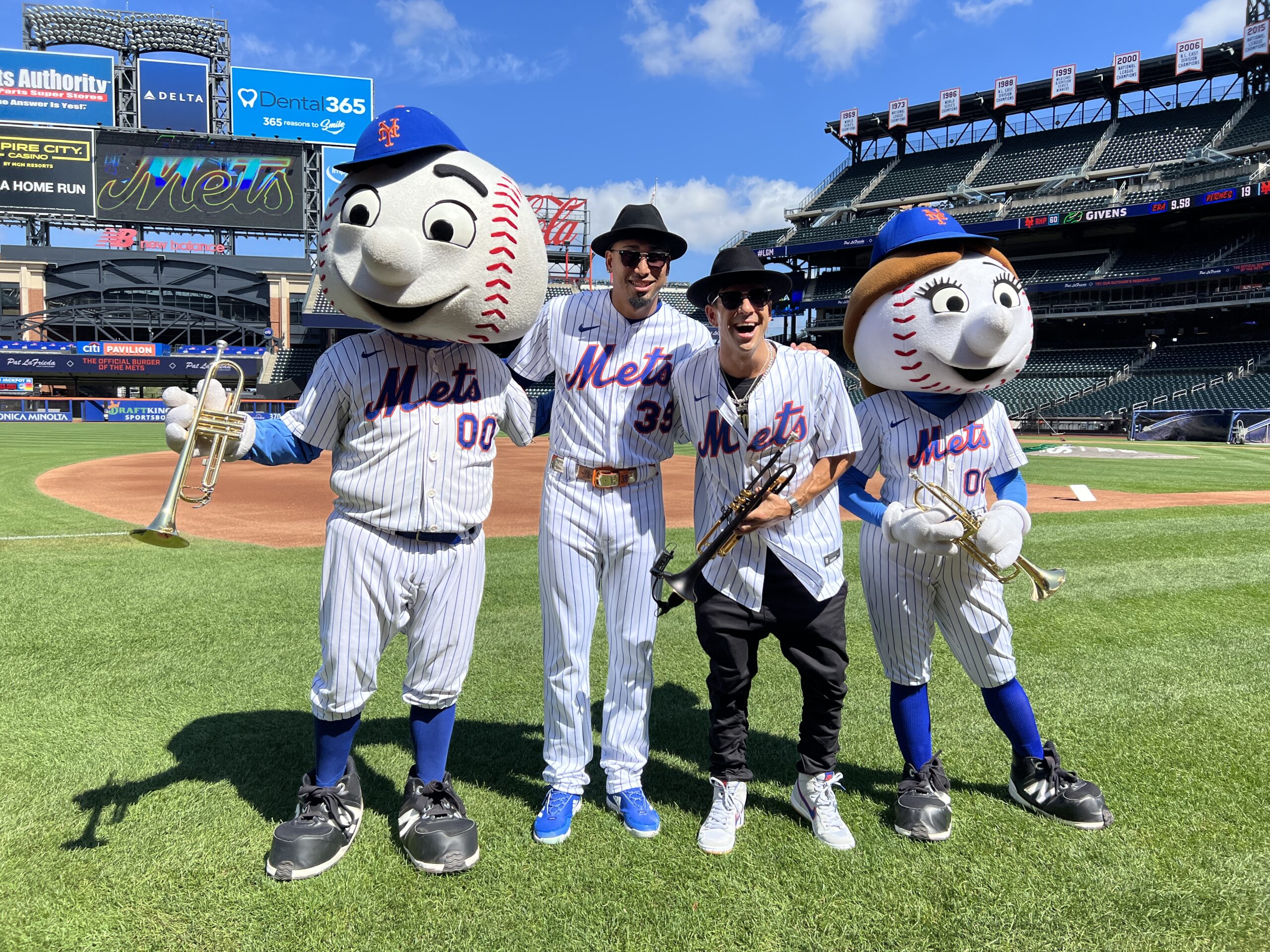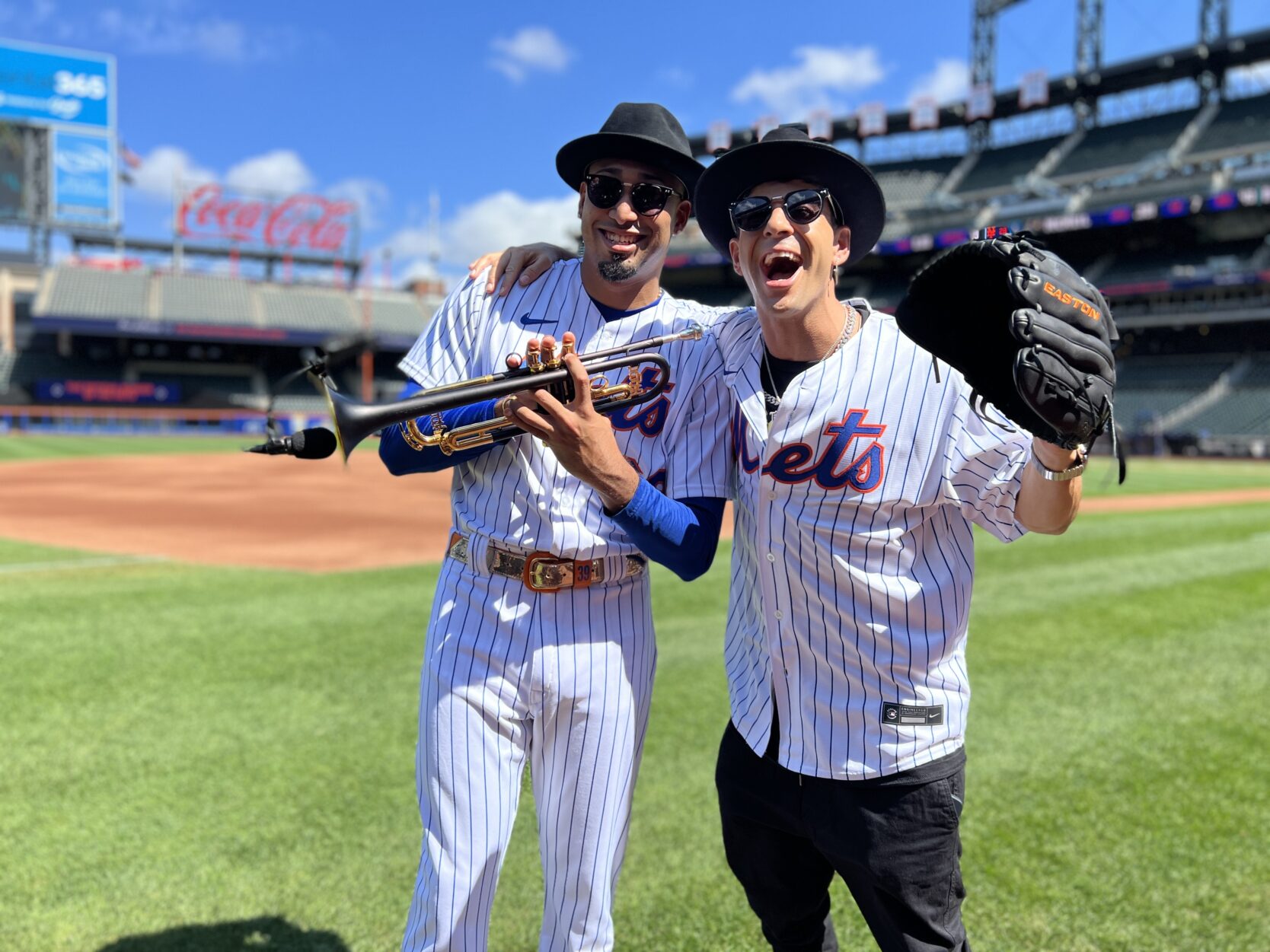As 42,000 perpetually nervous New York Mets fans looked on and the team clinged to a one-run lead over the Los Angeles Dodgers, who have the best record in baseball, on a breezy late-summer night in September. Ahead of the ninth inning, Australian trumpetist Timmy Trumpet waltzes out of the stands and onto the grass with his trumpet in hand. The 40-year-old musician is attending his second baseball game—the first was the night before—but he knows exactly what to do.
With trumpet in hand, the musician fires up the crowd by clapping overhead until the Mets’ All-Star closer Edwin Diaz is visible to the entire stadium. The crowd roars its approval, and Trumpet cocks his instrument back and begins to sharply belt the notes to “Narco,” his 2017 collaboration with Dutch DJ duo Blasterjaxx. As thousands clap in unison and play air trumpets, Diaz strolls onto the field, ready to pitch the final three outs and secure victory for his team.
After a few steps, that stroll is a full-on jog in rhythm with Trumpet’s staccato delivery. Mr. and Mrs. Met, the Mets’ instantly-recognizable cartoonish mascots, are belting imaginary notes from play trumpets as they dance atop the home dugout. Fans who arrived early enough to receive the day’s giveaway thrust play trumpets into the air. Minutes later, Diaz, with a series loss on the line and the spirit of “Narco” as the battery in his back, steps onto the mound and blows away the three hitters he faces. It is easily one of the most electric scenes Major League Baseball will see during its regular season.

Closers already play the most dramatic position in baseball. When a team is leading a game by a small margin—especially if that margin is just a single run—baseball managers will call on their closers to complete a simple but arduous task: get the final three outs of the game to secure victory. As simple as it sounds, it is one of the most consequential positions in all of sports.
Because of this, the “closer entrance” has become an implicitly tense baseball moment. At the peak of his career, Hall of Fame Yankees closer Mariano Rivera was known for his entrance to Metallica’s “Enter Sandman” under the bright lights of the storied Yankee Stadium. The present-day Baltimore Orioles have flexed their creative muscles and integrated The Wire lore into their pre-closer routine, blaring Omar’s precautionary whistle as the stadium lights flash on and off. The Wire is, of course, famously set on the streets of Baltimore.
Diaz’s entrance routine, however, is singular in its ability to transform the mood of a stadium. Whether Timmy Trumpet is physically on-hand to deliver the song or not, the “Narco” trumpet notes sound like a call for soldiers to report. The type of sound you might hear in a sci-fi movie before a gargantuan creature emanates out of the ground to save the good guys at the very last second. Fittingly, even college football teams have adopted it for its rallying nature. It sounds like triumph. And for Diaz, it not only sounds like triumph, but it also represents it.
After arriving in New York in a trade with the Seattle Mariners in late 2018, Diaz’s career derailed. Though dominant in Seattle (Diaz had 57 saves in 2018), his repeated ninth-inning falters became a sad running joke among Mets fans. The player tasked with securing victory appeared destined to forfeit it each time he was called into a game. He looked little like the All-Star closer New York traded for. It wasn’t just his performance that had changed. His entrance music was different, too.
Diaz’s tenure in Seattle was when he first began using “Narco” as his ninth-inning preamble. Upon arrival in New York, he figured he’d “switch it up,” he tells SPIN. For just a few moments, prior to the Dodgers game, Diaz and Timmy Trumpet are hanging out on the field jointly taking questions from the media. The impact “Narco” has had on Diaz, and thus the Mets and the orange-and-blue side of New York City, has become so palpable that a press scrum dedicated to questioning Trumpet and Diaz about their new relationship forms at the mere sight of them.
That “switch-up,” whether it was causation or correlation, helped mark the worst season of Diaz’s professional career. Then, one night prior to the 2020 season, Diaz gets a suggestion from his wife: go back to “Narco” and see what happens. “She asked me if I would change it back, and I figured ‘why not?’”
Trumpet may want to send along a thank you card. An established trumpetist and pop artist in Australia, Trumpet has experienced mega-successes of his own. His 2014 collaboration with the rapper Savage, “Freaks,” has been certified platinum six times by the ARIA. In 2019, he became the first trumpet player to perform in zero-gravity, a collaboration with the European Space Agency. Now five years after releasing “Narco,” Trumpet is unexpectedly experiencing another career peak. “It’s absolutely insane. It’s incredibly humbling and a great honor that a world-class athlete is using my song as inspiration to run on that pitch,” Trumpet gushes, as he fields questions beside Diaz.
During the COVID-19-shortened 2020 season, fans were not allowed in the stands. But with “Narco” blaring to cardboard cutouts of them, Diaz had a strong bounce-back year. In 2021 with scattered handfuls of fans back at Citi Field, Diaz reasserted himself as one of the better closers in baseball. However, the Mets’ season fizzled out in mid-July, and their resulting lack of visibility allowed Diaz’s scintillating entrance to fly under the radar.
This year, there’s no escaping it. The Mets have solved their mid-season troubles and appear ready to make a serious bid for a World Series berth. Diaz has gone from dominating hitters to embarrassing them, hurling over 100 mp fastballs and deceptive sliders past their chins and knees, strutting off the mound impressed with his own handiwork. And each time he’s ready to come into a game, tens of thousands of Mets fans hop to their feet, whip their phone cameras out, and peer behind the right field fence. Edwin Diaz and Timmy Trumpet are coming to save them.




